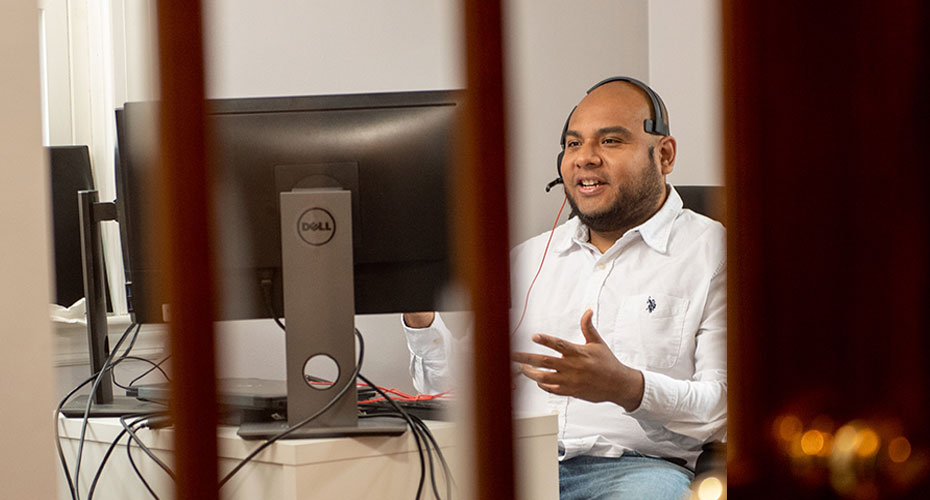Feb 28, 2023
Hola, Blue Cross
Juan Pablo Juarez will long remember the surprise and relief in the voices of Hispanic members of Blue Cross Blue Shield of Massachusetts the first time they called the health plan’s member service line and he started speaking to them in Spanish.
“Empathy doesn’t translate,” he said. “People need the human connection we are trained to provide at Blue Cross.”
Born in Peru, Juarez and his family immigrated to the US when he was 18. Going to school helped him become fluent in English but he remembers well what it’s like to be a newcomer. Those memories inspire his work.
“I understand not being understood,” he said.
An urgent need
In the U.S., about 1 in 10 adults struggle to communicate in English, according to Census data. That rate is mirrored in Massachusetts, where Spanish is by far the most commonly spoken non-English language.
“As the U.S. becomes more diverse, language and translation are becoming increasingly critical parts of practicing medicine,” the National Academy of Medicine notes.
Language barriers can have serious consequences in health care, preventing patients from finding the right clinician, communicating about symptoms, and expressing their needs.
“Patients who face such barriers are less likely than others to have a usual source of medical care; they receive preventive services at reduced rates; and they have an increased risk of nonadherence to medication,” researchers have found.
Skilled interpretation can help patients overcome such barriers, both in the doctor’s office and in the often-complicated area of health insurance.
Taking action
Juarez is a member of a Blue Cross program created at the suggestion of Spanish-speaking employees eager to meet the needs of members.
Before the team was formed, when a Spanish-speaking member requested translation, an interpreter from an external translation service joined the call and translated both sides of the conversation. Blue Cross continues to use external interpreters for members who speak a broad range of languages, including Portuguese and Mandarin Chinese.
But native Spanish speakers on the member service team, including Juarez, suggested they could provide a better experience for the 80% of non-English speaking members who are more comfortable speaking in Spanish.
The work is part of Blue Cross’ broader health equity initiatives, including new payment models aimed at rewarding clinicians for addressing inequities in care.
The multilingual program is proving a success: In just eight months, the team has managed more than 16,000 calls.
“We do more than answer their questions,” said Leila Goncalves, a manager in Blue Cross’ member service department who leads the Spanish-language team. “We help these members understand how health insurance and their particular health plan works, how it fits in the health care system, and we make them more informed health care consumers.”
Juarez, who handles up to 30 calls in Spanish a day, was struck by the importance of the work one day when he was on the phone with a member who needed radiology services.
“I could tell she was frustrated because she didn’t understand what her insurance would cover and what she would have to pay,” he recalled. “As soon as I started talking to her in Spanish, she began to feel better. It was like this huge weight was lifted off her shoulders.”
Such interactions provide more than translation. They provide a sense of connection, said Dr. Ximena Sanchez-Samper, a Blue Cross psychiatrist who provides clinical care in her native Spanish when a patient prefers it.
“It’s about culture. Culture is the essence of who we are, how we see the world and how we relate to it,” she said.
Hispanic culture is as varied as the number of countries where Spanish is spoken. Yet, Sanchez-Samper notes:
Language is a common denominator that breaks barriers, creates deeper relationships and kindles a sense of community, leading to better clinical comprehension, less anxiety and better health care.

Dr. Ximena Sanchez-Samper
Did you find this column informative?
All Coverage content can be reprinted for free.
Read more here.
PHOTOS BY CHRIS EVANS

